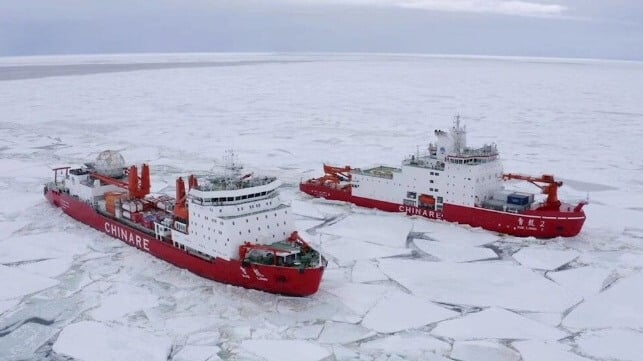China Launches Antarctic Expedition, Blocks Key Conservation Proposals

On Friday, China embarked on its 41st Antarctic expedition as the country ramps up its presence in the Southern Ocean. For this mission, China has deployed three vessels, including the icebreaking research ships Xuelong and Xuelong 2. The other vessel is the cargo ship Yongsheng, which is carrying mission support materials.
The mission is scheduled to last until May 2025. Notably, for the first time the expedition includes scientists from Hong Kong. This marks the start of in-depth cooperation between mainland China and Hong Kong in polar science research, according to Chan Kwok-Ki, Chief Secretary of Hong Kong. Chan attended the send-off event for the mission at the Guangzhou Nansha International Cruise Port. He had accompanied the six Hong Kong scientists selected for the expedition.
During this mission, the researchers will complete the construction of supporting infrastructure for the Qinling Station in Antarctica. Strategically located on the ice-free Ross Sea, Qinling Station is the fifth Chinese research facility in Antarctica. It was launched in February. In addition, the researchers will also continue with ongoing research on the impact of climate change on the Antarctic ecosystem. The team will conduct further environmental monitoring in key regions, including Prydz Bay in East Antarctica, the Cosmonauts Sea, the Ross Sea, the Amundsen Sea and the Antarctic Peninsula.
But even as China strengthens its presence in Antarctica, it has been accused of teaming up with Russia to upend governance in this critical polar region. In the just concluded Commission for the Conservation of Antarctic Marine Living Resources (CCAMLR) annual meeting in Hobart last week, China and Russia blocked critical proposals aimed at conservation of marine life in Antarctica. Some of the key proposals included establishing four new Marine Protected Areas (MPAs) in the region. Since 2016, China and Russia have opposed this proposal despite a majority of CCAMLR members approving it.
The two countries also vetoed the renewal of a krill fisheries management measure which has been in place for over three decades. The krill management measure provides a mechanism that limits krill fishing in a protected area near the Antarctic Peninsula to no more than 620,000 tons. Another 620,000 tons of fishable krill are redistributed across several sub-regions of Antarctica, which helps prevent overconcentration of krill fishing in one area. However, this measure has to be renewed annually by CCAMLR members.
Krill is a small shrimp-like crustacean, which acts as an important food source for keystone species in Antarctica such as penguins, seals and whales. “The precautionary principle on fishing restrictions in Antarctica that has been supported by CCAMLR countries has gone backwards. This sets a very bad precedent for the future,” said Tony Press, former Head of the Australian Antarctic Division (AAD).
